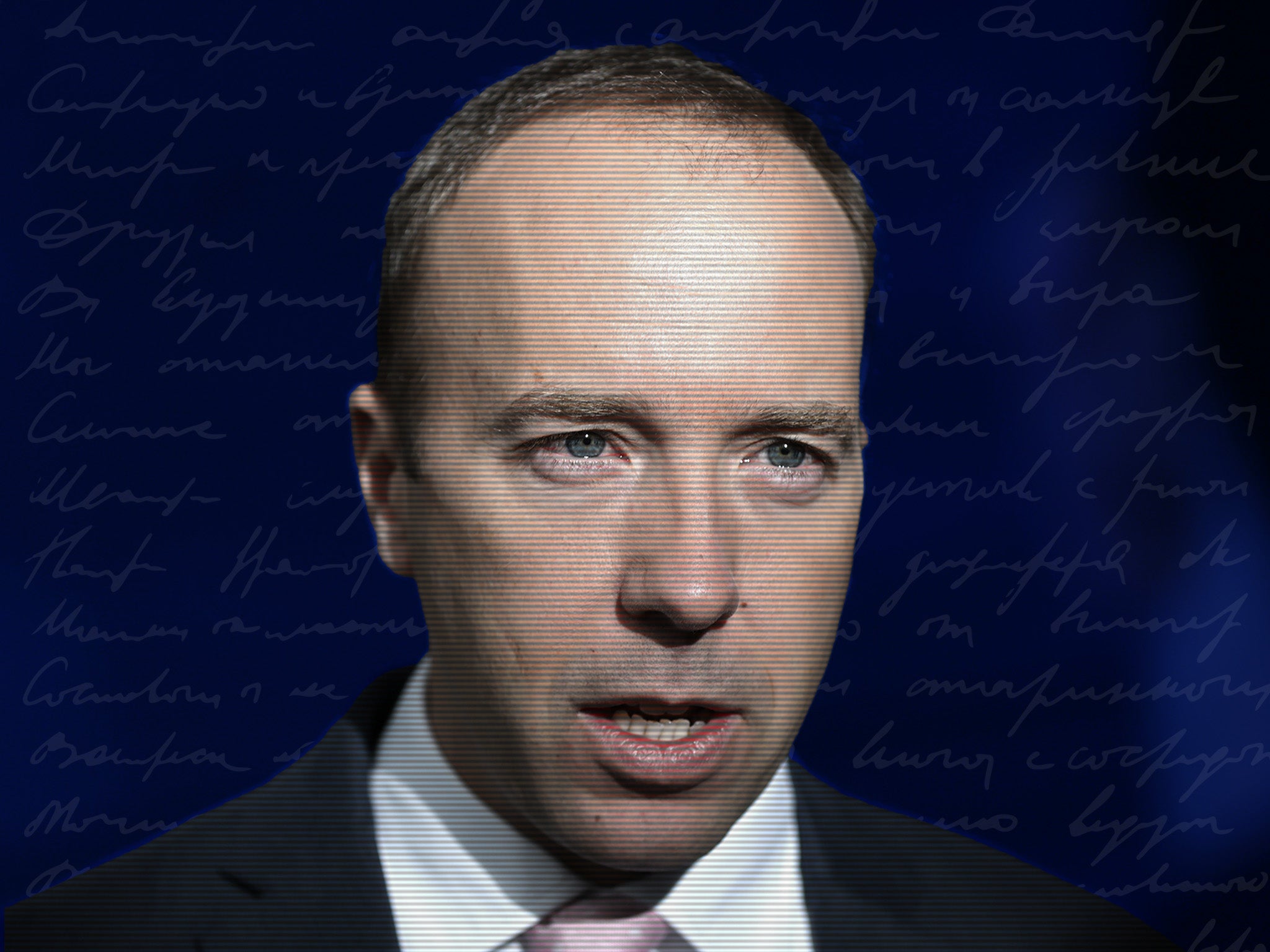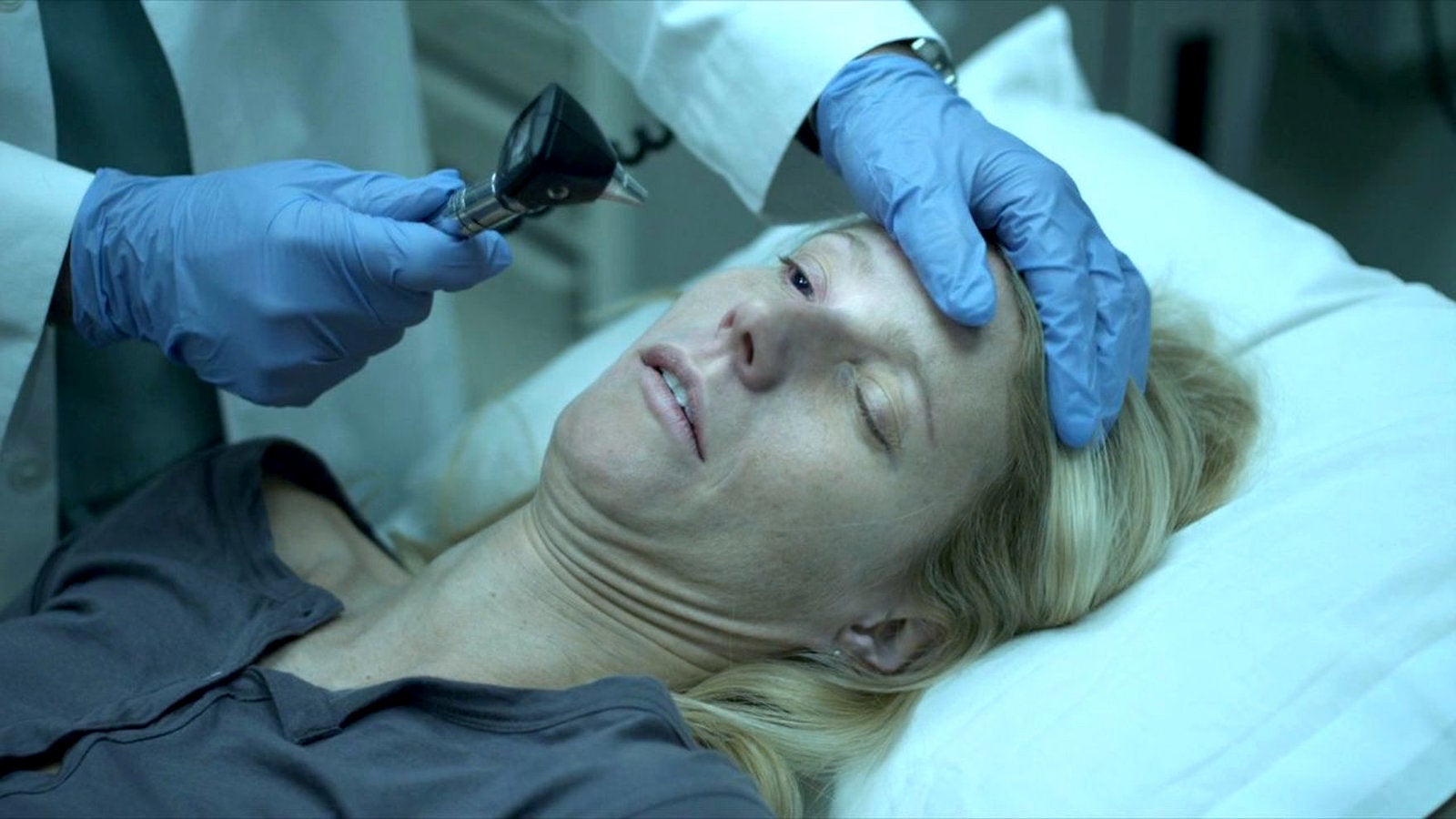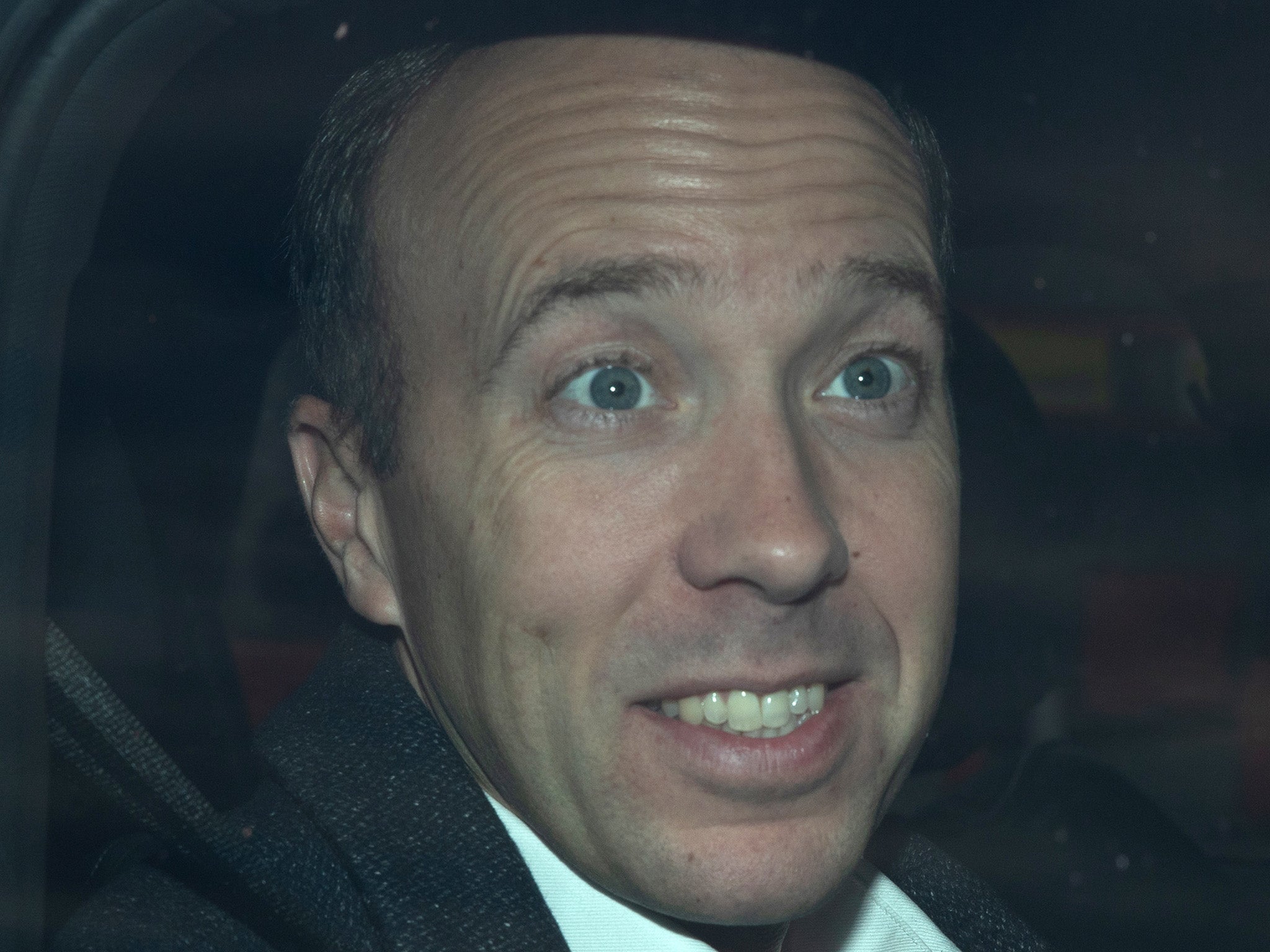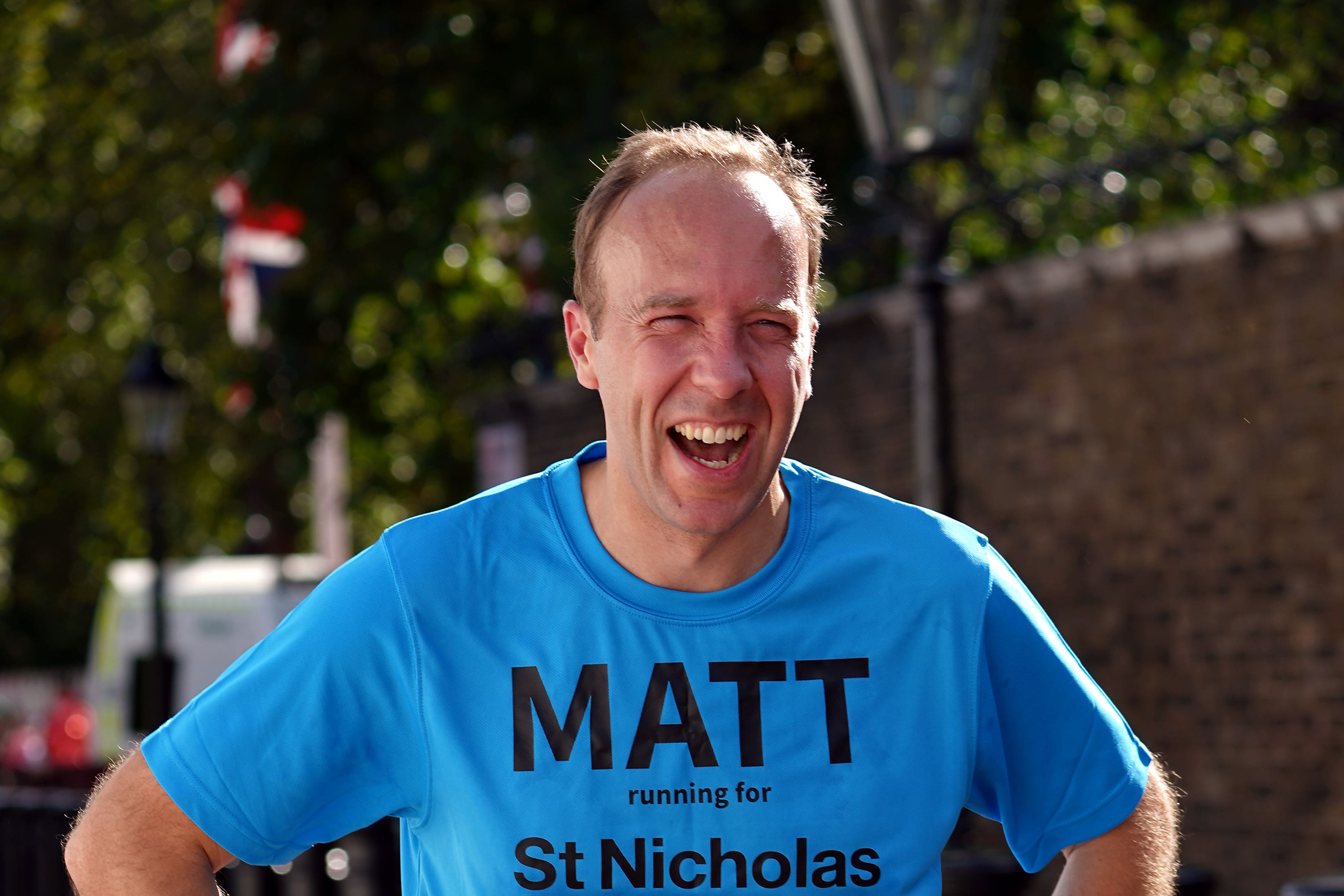10 of the most eyebrow-raising moments in Matt Hancock’s book, The Pandemic Diaries
The former health secretary and ‘I’m a Celebrity... Get Me Out of Here!’ contestant has released his controversial memoir about the pandemic and the fallout from the scandal involving his aide, Gina Coldangelo. Roisin O’Connor picks through some of the book’s biggest moments


Your support helps us to tell the story
This election is still a dead heat, according to most polls. In a fight with such wafer-thin margins, we need reporters on the ground talking to the people Trump and Harris are courting. Your support allows us to keep sending journalists to the story.
The Independent is trusted by 27 million Americans from across the entire political spectrum every month. Unlike many other quality news outlets, we choose not to lock you out of our reporting and analysis with paywalls. But quality journalism must still be paid for.
Help us keep bring these critical stories to light. Your support makes all the difference.
Matt Hancock’s new book, The Pandemic Diaries: The Inside Story of Britain’s Battle Against Covid, is widely viewed as an attempt by the former health secretary to salvage his reputation. A brave move, given his last attempt resulted in him eating cow anus.
Many have called out Hancock for the timing of the book – which arrives amid a public inquiry into the government’s Covid response – and also questioned many of the claims he has included.
In The Pandemic Diaries, ghostwritten by political journalist Isobel Oakeshott, Hancock, 44, details his perspective of the coronavirus pandemic and how he believes he dealt with the crisis, including mass testing, the vaccine rollout, and the notorious scandal involving his aide, Gina Coldangelo, which culminated in his resignation in June 2021.
Recurring themes include much criticism of former Downing Street aide Dominic Cummings, whom Hancock brands the “chatty rat” after he allegedly leaked news of a second lockdown. Hancock makes no effort to hide his dislike of Cummings, to the point that he admits celebrating when Cummings resigned on 13 November 2020.
Elsewhere, he claims to have spent a few days in the height of the pandemic working from his children’s treehouse due to dodgy internet; he describes his experience of having Covid; he observes his colleagues, including former prime minister Boris Johnson, falling ill; and defends his relationship with Coldangelo. Hancock frequently seeks to present himself as the man who tried to raise the alarm on Covid for weeks, only to be dismissed as an alarmist and told by Johnson that it would “probably go away”.
Here are some of the biggest, and most eyebrow-raising, moments from the book...
Hancock compares himself to a soldier at war
In the prologue, Hancock describes exhausting days that involved replying to “literally hundreds of emails and messages and dozens of phone calls”, in addition to “the press conferences, parliamentary statements, social media posts and videos and TV and radio interviews, of which I naturally did more than any other member of the government”.
He explains, however, that “none of this is for sympathy”. Accepting the role of health secretary was his choice, he writes, “and a pandemic is an occupational hazard, as war is to a soldier. To serve in this way was an honour. All I can say is that I did everything that I could.”
Trying to raise the alarm on Covid
In diary entries from the beginning of January 2020, Hancock claims to have observed reports about a “mystery pneumonia outbreak” in China, and that he sought to raise this after the Christmas break. He claims that Cummings didn’t want anything to distract from Brexit, and that his peers finally paid attention to it weeks later, when the virus had already begun spreading to other countries, while he was asking about a vaccine as early as 14 January. He also claims that he raised the possibility of screening at airports early on, only to balk at the thought of transport secretary Grant Shapps’s reaction, given his “love of flying”.
“[He] would go ballistic if we even suggested it,” Hancock writes. “What would make a massive difference is if the Chinese stopped people leaving Wuhan. I’m struggling to see how they justify letting people flood out of the city when they know there’s such a big potential problem.”
Hancock also elaborates on how the film Contagion, starring Kate Winslet, Matt Damon, Jude Law and Gwyneth Paltrow, inspired his vaccine rollout.
“The potential parallels are unsettling,” he writes in an entry marked 17 January. “In the movie, a vaccine is the only way out – though the real tensions only build after the jab is developed, as everyone starts fighting over who gets it.
“When I woke up today I was briefly unable to distinguish fiction from reality. Were millions dying on my watch? Had the pandemic gone global? Thank God, no.”

Care homes
Hancock makes multiple references to his supposed stance on care homes during the pandemic, writing on 2 April 2020 that “we must make sure that anyone going from a hospital into a care home is kept away from other residents”. Then, on 31 July, he writes: “Good news on banning staff movement in care homes. After I blew my top at the weak advice, officials have got the message. However, Helen thinks the number of outbreaks in these settings may have been higher than PHE’s data suggested. ‘Oh Christ,’ I replied, head in hands. I’m worried that we’re still not doing enough testing to keep residents safe. I will talk to Dido to see if Test and Trace can divert more capacity.”
The following year, on 27 May 2021, he claims that the majority of Covid infections in care homes were due to staff being infected, as opposed to the government policy of releasing hospital patients back into care homes without testing them. In April this year, the government decision to allow untested hospital patients to move to care homes at the start of the pandemic was ruled “unlawful” by the High Court.
He’s received some odd nicknames from his peers
“I sent a birthday greeting to Sir Nicholas Soames,” he writes. “I share so many political views with the old grandee, who retired at the 2019 election. He used to call me ‘Matty Moo Moos’, including once on Twitter, where he achieved some unexpected, late-career fame. Parliament is less colourful now he’s gone.”
Later, he claims that George Osborne compared him to Tigger from Winnie the Pooh: “My natural style is highly enthusiastic and positive, prompting my old boss George Osborne to liken me to Tigger from Winnie the Pooh, saying there are far too many Eeyores in Westminster. I couldn’t agree more – there are – but I know I have to change my tone now. I have to respond in a way that fits the seriousness of the situation, but it’s not easy. I believe it’s vital to play it straight with people, even if the way I talk grates with them a little. This is not a time for rhetorical flourishes.”

The unfortunate, accidental (?) sexual references
In the book, Hancock describes his office, painted a deep burgundy colour, which makes it feel “like a cocoon”. He later refers to it as his “red office”, which, intentionally or not, reminds me of Christian Gray’s Red Room in Fifty Shades of Grey.
There’s another unfortunate reference to naff erotic fiction when he addresses the Coldangelo scandal, as he quotes: “What price love?” Presumably this is a quote from the title of the 1929 German silent film by director EW Emo. The first search result, however, brings up an erotic novel of the same name by Stephanie Laurens.
Me Me Me
Many of Hancock’s recollections involving the pandemic involve mentioning how exhaustive his efforts are, how tired he is. In an entry marked 23 April, he recalls: “I was so shredded after my last meeting that I collapsed on the small sofa in my office, flopping my feet over the arm. I was still lying in this undignified position when Wormald came through the door, looking slightly concerned at my crumpled appearance.
“‘I still feel like I’m running this entire operation,’ I said wearily, conscious that it sounded a bit ‘me me me’.
“‘Effectively, you are,’ he replied.”
Later, he claims that Johnson “acknowledged that I’m like a one-man War Cabinet right now and wants to get someone else in to manage the PPE situation”.
Then, on 7 August, he revels in his newfound celebrity as the leader of the pandemic response, which he learns about during a family break in Hay-on-Wye.
“When we got to the pub at the far end [of the river], there was great excitement. I’m not used to people spotting me, except in Suffolk, where I’ve been on the leaflets for years, so the universal recognition is a bit of a shock. Something I’ll have to get used to, I suppose.”
Later, however, he gripes about the media coverage of the vaccine rollout, in an entry marked 31 December.
“I think it was Margaret Thatcher who said if you want approval, go into show business,” he comments. Well, we know how that turned out, Matt.

Spending a few days during the pandemic working from his kids’ treehouse
In an entry marked 24 August 2020, Hancock claims he spent a few days working from his children’s treehouse, at his family’s rented constituency house in Suffolk. During an internet outage, it was suggested that he use an iPhone hotspot instead.
“Unfortunately, I only get 4G in the garden, and even there, it’s patchy,” he writes. “Ridiculously, the best spot is 12 feet up an old ash tree in the treehouse I painstakingly built with the kids last year. Behold the temporary new offices of the Secretary of State for Health.”
Rock and roll

The noted grime fan makes a few pop culture references during the book (asides from the previously observed erotic fiction ones). At the Brit Awards in 2020, he recalls feeling panicked as Rolling Stones member Ronnie Wood offered him a pick-me-up, apparently wondering if he was about to be handed an illegal substance on live television. Instead, Wood apparently gave him a Mini Babybel, as Hancock had complained he was starving after missing the awards show dinner.
In a diary entry marked 11 November, he appears to confuse the Gallagher brothers, as he spots Cummings by Speaker’s House two days before his resignation: “At first I didn’t even recognise him. I was walking through the courtyard after PMQs and saw a guy dressed like Noel Gallagher, shambling along in a ridiculous hat and raincoat. I assumed it was some civil servant,” he writes.
Presumably he means Liam, here, who is a fan of the parka and bucket hat combo.
Sobbing on daytime TV
One of the most widely mocked moments in Hancock’s book is his claim to have “sobbed” on Good Morning Britain on the day the first vaccine was administered in the UK.
“‘You need to relax,’ was Gina’s advice, by which she meant, ‘Stop being so buttoned up,’” Hancock writes. “What she did not mean was that I should lose it altogether, which unfortunately is exactly what happened later. I was on my own in a dark windowless booth, answering questions from GMB, when they played the video of Margaret Keenan getting her jab. I hadn’t seen it before and was suddenly overwhelmed by the magnitude of it all. I had completely lost it, blubbing away, battling to regain my composure as tears streamed down my face.
“‘For Christ’s sake, pull yourself together,’ I told myself desperately. There were five-four-three-two-one seconds to go and then the camera was back on me, my microphone was live and my watery red eyes were there for all to see.”
Hancock’s depiction of this moment is far from what many remember it as. Host Susanna Reid admitted last week that she believed Hancock was laughing, at first, while viewers accused him of a “shameful” performance. Pull yourself together, indeed.

Gina Coldangelo
Right towards the end of the book, Hancock reaches the scandal that led to his resignation as health secretary.
“What price love?” he questions. “I’ve always known from the novels that people will risk everything. They are ready to blow up their past, their present and their future. They will jeopardise everything they have worked for and everything that is solid and certain.”
What follows is a lot of stomach-turning prose. Hancock claims nothing happened between them until May, after legal restrictions ended, along with describing the “turmoil” that accompanied the “joy of falling in love”.
He also recalls the conversation he claims took place between him and Johnson, alleging that Johnson gave him personal as well as professional advice and reassured him that “my private life should not affect my public position”.
“Whatever anyone may say of him, I’ll always be immensely grateful for our conversation. He was thoughtful, considered and as supportive as he could be for everyone involved,” he writes.
‘The Pandemic Diaries: The Inside Story of Britain’s Battle Against Covid’ is out now.


